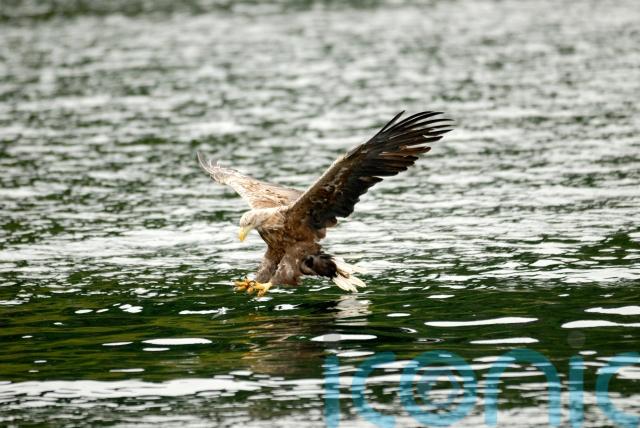
Analysis indicating avian flu may have harmed the successful breeding of eagles in Scotland is “very concerning”, an expert has said.
A British Trust for Ornithology (BTO) analysis, published by NatureScot, found the proportion of golden eagle pairs successfully rearing young fell from 48% to 28% in 2021.
In the same period, the data, from the Scottish Raptor Monitoring Scheme, shows breeding success for white-tailed eagles dropped from 67% to 45%.
This species appears to have been worst affected in coastal areas, which may indicate a possible link between infected seabirds and waterfowl preyed on or scavenged by eagles.
The largest declines recorded for both eagle species were in Lewis and Harris in the Western Isles, where breeding success of golden eagles fell from 55% to 16%, and breeding success of white-tailed eagles dropped from 66% to 24%.
The first cases of avian flu in birds of prey were detected in November 2021, and by April 2022, there were positive tests results for a range of species.
The study found evidence for regional impacts on some species, such as lower breeding success for ravens in Orkney and Shetland, and for peregrine falcons in Tayside. However, these impacts appear more localised than for eagles.
Factors such as as weather and prey availability can affect breeding success in birds of prey, leading to lower brood sizes or fewer chicks fledging, but the 2022 data showed the young in a nest being completely wiped out was more frequent than some chicks in a nest surviving – said to be consistent with the effect of a highly contagious and pathogenic disease such as avian flu.

John Allan, NatureScot ornithology advisor, said: “Scotland still has strong eagle populations but these findings are very concerning.
“So far we have had fewer positive test results among birds of prey this year than last year, but it is early in the season and we can’t be complacent.
“We intend to repeat this analysis in 2023 to see if breeding success begins to improve.”
He said members of Scotland’s avian flu taskforce are working to understand the virus and improve the resilience of wild bird populations.
Mark Wilson, BTO Scotland acting head of science, said: “We know from laboratory tests for the virus in dead birds of prey that avian flu can kill both adult and nestling raptors.
“However, testing of live and dead chicks is too infrequent to be certain about how widespread this disease was among raptors in 2022, or how many of last year’s breeding failures were caused by avian flu.
“Nevertheless, the findings of this study are consistent with worrying impacts on Scottish eagle populations.”
Subscribe or register today to discover more from DonegalLive.ie
Buy the e-paper of the Donegal Democrat, Donegal People's Press, Donegal Post and Inish Times here for instant access to Donegal's premier news titles.
Keep up with the latest news from Donegal with our daily newsletter featuring the most important stories of the day delivered to your inbox every evening at 5pm.